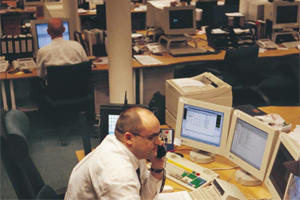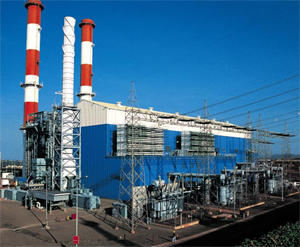

|
ENRON OWNS MORE than 1,000 megawatts of generating assets that are less than 10 miles from New York City, a market that has huge and growing energy requirements. These assets give Enron greater flexibility in dispatching electricity to customers in this region.
|
Enron is the premier integrated energy merchant in the rapidly growing competitive North American wholesale energy market. Enron has the only energy network in North America with a continental scope; strategically located assets; an unparalleled position in electricity, natural gas and coal marketing; state-of-the-art systems and above all, highly skilled employees that have led the recent move to competitive markets.
The move to cleaner, more efficient and more flexible power plant fuels is projected to increase incremental gas demand in North America by 2 to 3 trillion cubic feet per year beginning in three to five years. In addition, the non-regulated electricity market is expected to grow at a rate of 35 to 40 percent per year over the next five years. With a strong platform in place, Enron is focusing on fortifying the scale, scope, flexibility and speed of its North American energy network.
As electricity prices in North America temporarily rose from $20 per megawatt hour to as much as $7,500 per megawatt hour in mid 1998, Enron recognized a need for new, flexible generating capacity that would be able to respond quickly to the market. Enron moved immediately to begin construction on 1,300 megawatts of peaking facilities in Mississippi and Tennessee that will begin commercial operation in the summer of 1999. In addition, Enron recently acquired gas-fired generating assets representing more than 1,000 megawatts, the majority of which is connected directly to, and is located less than 10 miles from, New York City. In addition to strengthening Enron's flexibility in dispatching natural gas, the plants produce reliable electricity for customers
in one of North America's most energy-intensive markets.
Enron's unique outsourcing agreement with a Northeast local distribution company (LDC), representing 140 billion cubic feet (Bcf) per year with a peak load of approximately 1 Bcf per day, also illustrates how the company is focused on fortifying its energy network. Enron manages all of the LDC's transportation, gas supply and storage agreements upstream from the city gate. This agreement gives Enron leverage for faster response to changes in the natural gas markets along the U.S. East Coast. Enron is employing this same asset management strategy in other regions of North America where energy markets are expanding.
In addition, Enron's North American franchise is benefiting from increased flexibility at the company's Bammel storage field north of Houston. Enron has increased the field's withdrawal capacity from 890 MMcf/d to 1.2 Bcf/d, and its injection capacity from 365 MMcf/d to 470 MMcf/d (at an inventory level of 80 Bcf). These enhancements give Enron the capability to serve an additional 3,000 megawatts of gas-fired electricity in the Houston area, or, the gas can be delivered into the Texas market or transported to the East Coast or the Midwest on a moment's notice.
North America
Fortifying the energy franchise

| |
ENRON HAS A STRONG presence in Oslo, where it is the NordPool market maker, and is continuing to build on its position as a leading gas and electricity marketer in the U.K. As new markets open across Europe, Enron's strategy is to 'be first' in these deregulating markets and to establish competitive advantages for the future.
|

| |
THE DABHOL POWER PROJECT, developed by Enron and its partners, is the first independent power project in the state of Maharashtra, India. The first 826 megawatts of the project began commercial operation in early 1999. The 1,624-megawatt second phase is scheduled to come on line in 2001.
|